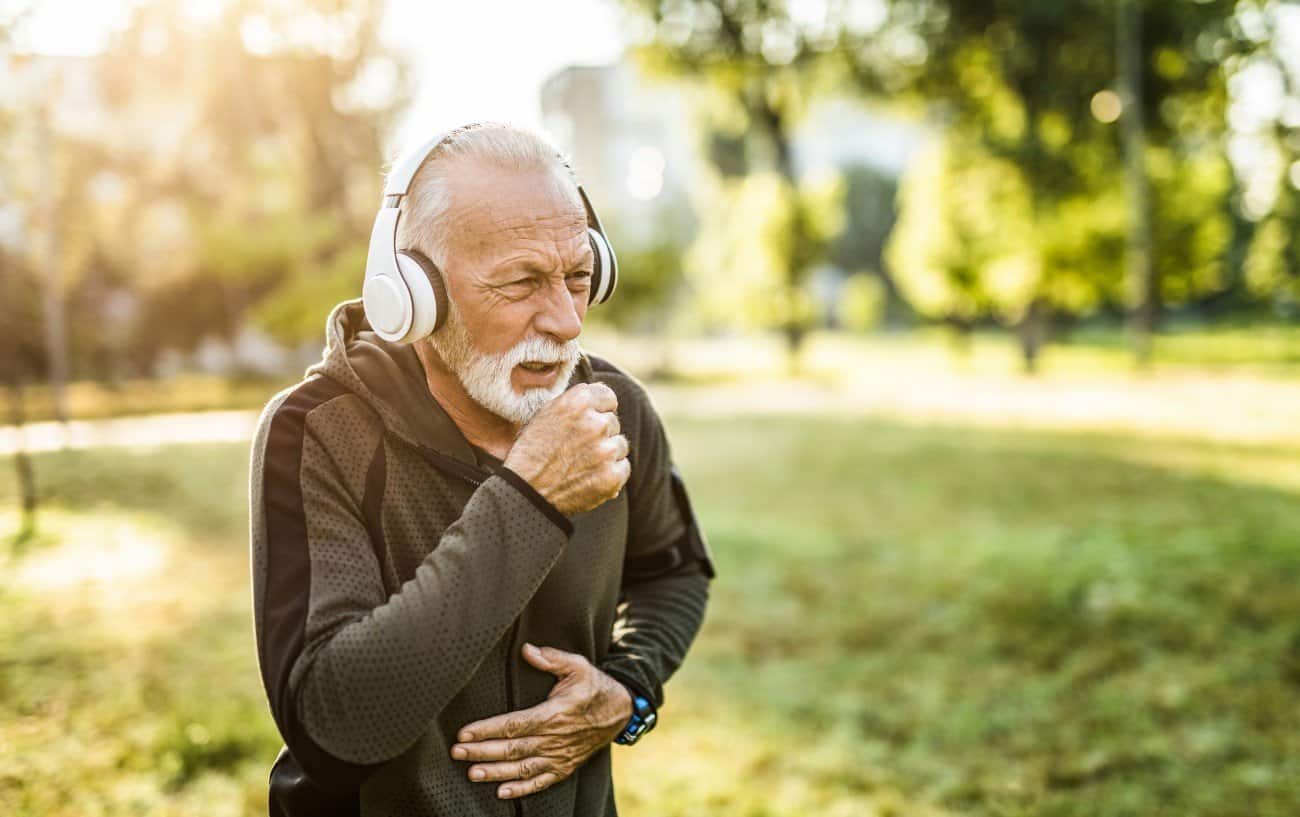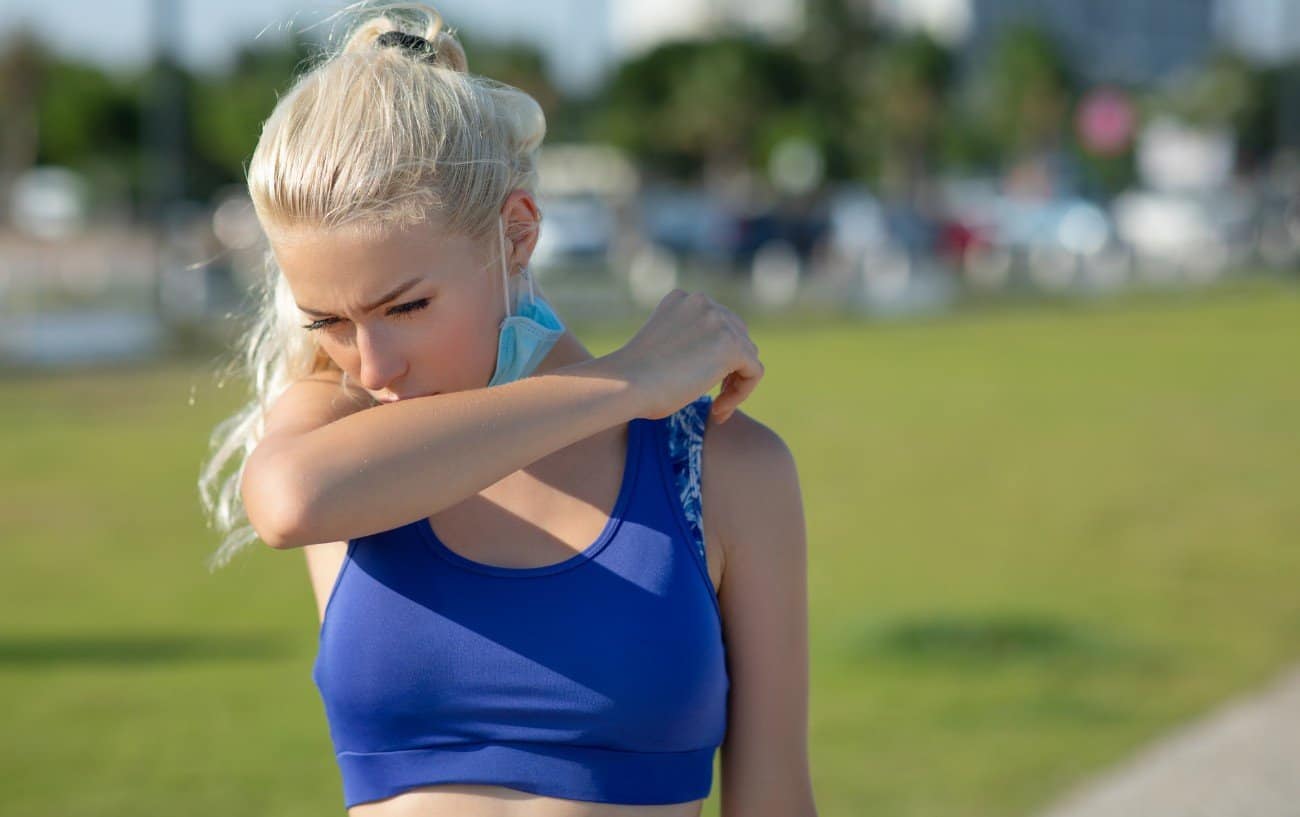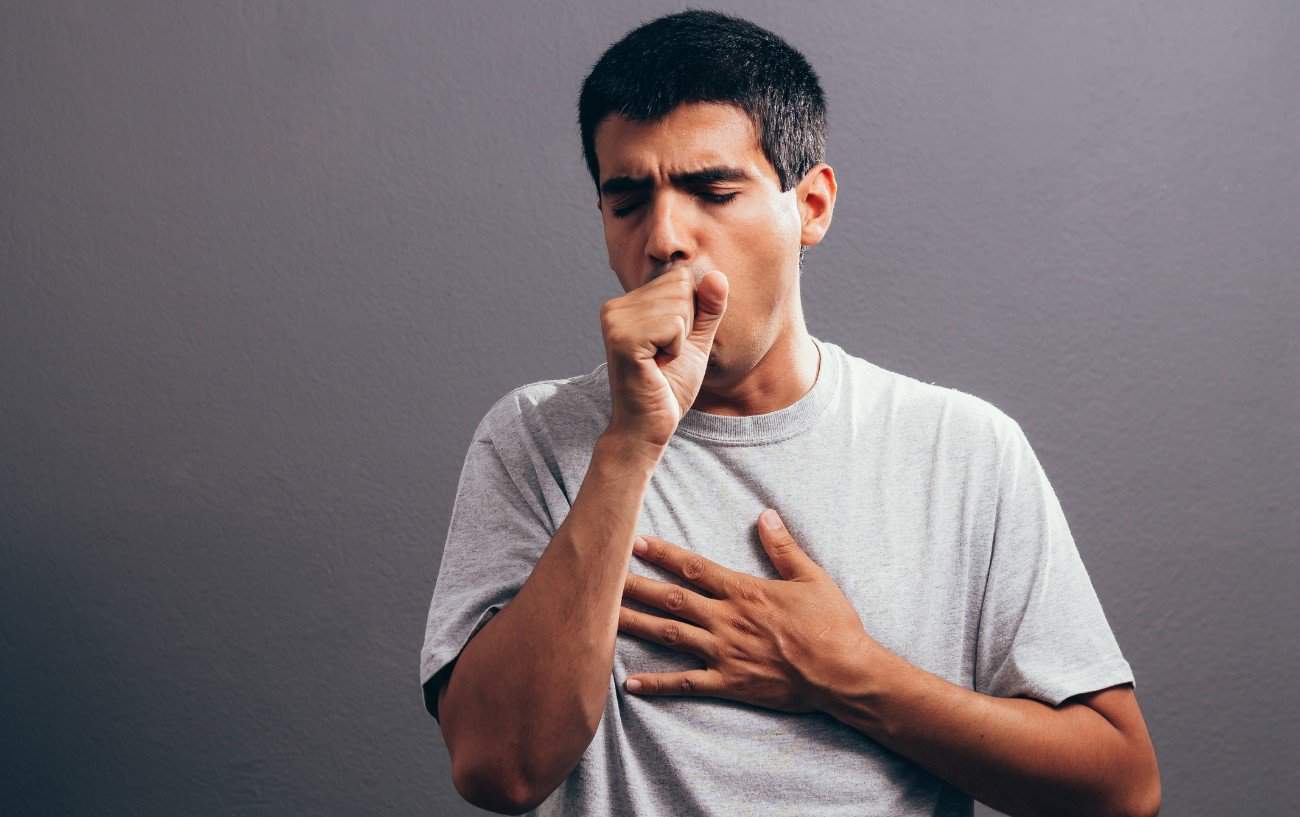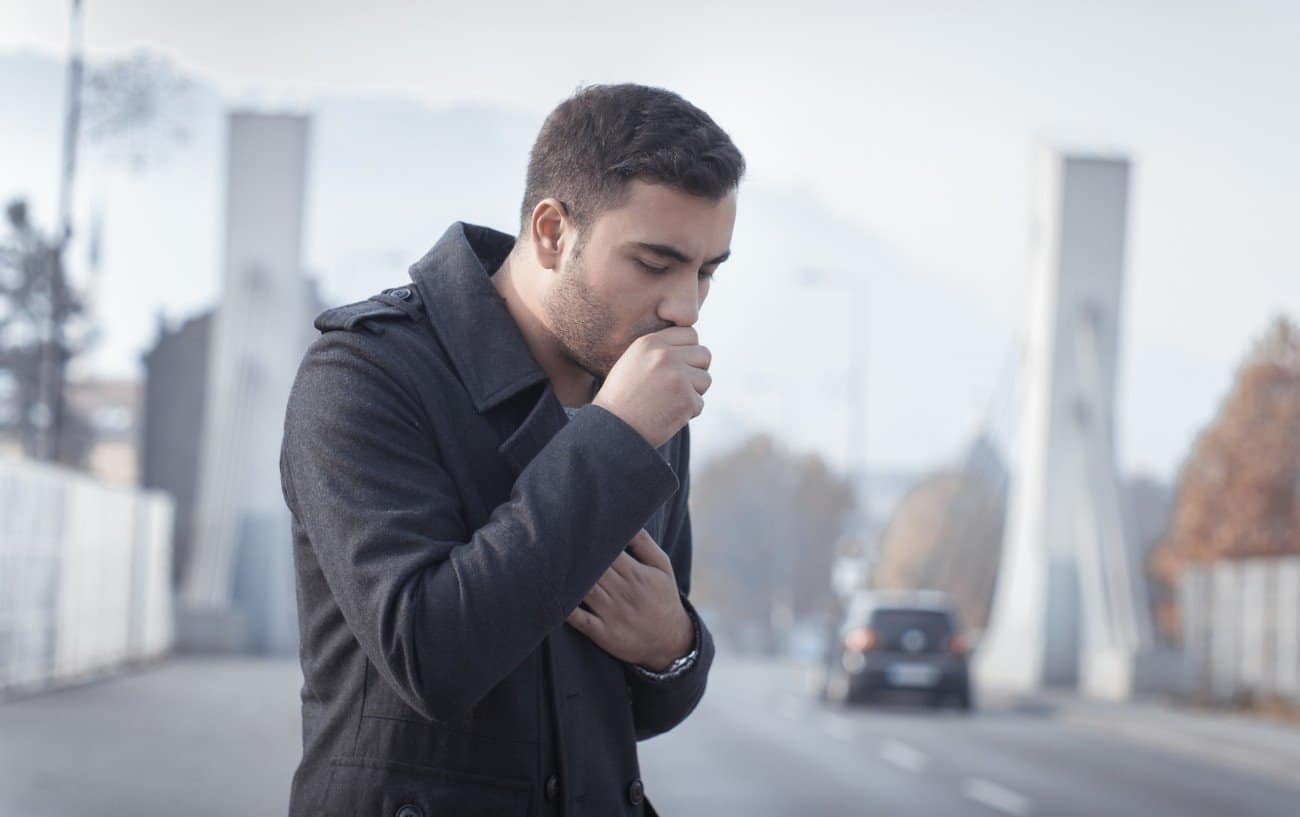Coughing after running, sometimes reffered to as runner’s cough, can happen to beginners and advanced runners alike.
There are multiple possible causes that can provoke runner’s cough, including weather conditions, allergies, the athlete’s current fitness level, and even underlying medical conditions.
In this guide to coughing after running, we will discuss the ten most common causes of why you may have a case of runner’s cough and our top tips to prevent it from happening in the future.

Is It Normal To Cough After Running?
Runner’s cough, which can describe coughing while running or a post-run cough, is fairly common but not necessarily normal.
Even elite athletes can deal with coughing after running, as there are several potential reasons why running causes coughing.
For example, runner’s cough can be caused by environmental irritants, poor air quality, or cold air, but there can also be underlying medical conditions that cause coughing after working out.
Therefore, it’s important to seek medical attention and work with a healthcare provider if you are habitually coughing after running or you have additional symptoms such as wheezing, sneezing, difficulty breathing, lightheadedness, dizziness, or a rapid heart rate.
Moreover, this discussion should not be taken as medical advice. I am a certified running coach but I am not a medical professional.

Why Do I Cough After I Run?
Here are some of the most common causes of coughing after running:
#1: You’re a Beginner
A common cause of mild difficulty breathing while running or coughing while running is simply having a poor aerobic fitness level.
Running is a high-intensity physical activity, and beginner runners may not have the cardiovascular fitness to support the oxygen demands of their muscles and heart while long-distance running.
It takes time to strengthen your heart and lungs and improve the efficiency of your cardiorespiratory system.1Romero, S. A., Minson, C. T., & Halliwill, J. R. (2017). The Cardiovascular System after Exercise. Journal of Applied Physiology, 122(4), 925–932. https://doi.org/10.1152/japplphysiol.00802.2016
#2: Running In Cold Weather
One of the most common causes of runner’s cough is running in dry, cold air.
Fortunately, although this doesn’t make the coughing or chest tightness while running any less uncomfortable, it’s completely harmless and it’s not a cause for concern.
Running outside in the winter exposes your respiratory system to cold, dry air.
The lungs need warm and humid air, and cold air can irritate and burn your trachea (windpipe) and bronchi (airways leading into the lungs).
Your airways can constrict and the “shock“ of the cold air can trigger coughing after running or while running.

#3: Acid Reflux
Acid reflux or gastroesophageal reflux disease2Mayo Clinic. (2023, January 4). Gastroesophageal reflux disease (GERD) – Symptoms and causes. Mayo Clinic; Mayo Clinic. https://www.mayoclinic.org/diseases-conditions/gerd/symptoms-causes/syc-20361940 (GERD) can potentially cause a burning sensation in your lungs or coughing when running, especially if you go running too soon after eating or eat foods that trigger acid reflux such as citrus fruits, tomatoes, or other acidic foods, soda, coffee, or fatty foods.
With acid reflux, the sphincter, or band of muscular tissue, between the stomach and esophagus is weak.
This allows some of the acidic gastric juices to splash upward into the esophagus and throat.
Running can exacerbate acid reflux due to the mechanical jostling and increased intra-abdominal pressure caused by your diaphragm pressing downwards, your lungs expanding, and your abdominal muscles contracting.
#4: You Have Exercise-Induced Asthma
According to the American Lung Association,3American Lung Association. (n.d.). Asthma Trends and Burden | American Lung Association. Www.lung.org. https://www.lung.org/research/trends-in-lung-disease/asthma-trends-brief/trends-and-burden the prevalence of asthma in the general population in the United States is roughly 13%, with women and African Americans having even higher rates.
Runners with asthma4Mayo Clinic. (2022, March 5). Asthma – symptoms and causes. Mayo Clinic. https://www.mayoclinic.org/diseases-conditions/asthma/symptoms-causes/syc-20369653 are at an increased risk of experiencing post-run coughing.
Exercise-induced asthma, medically referred to as exercise-induced bronchoconstriction (EIB) is a form of asthma, a chronic lung disease that causes inflammation in the airways.
Asthma can be triggered by different things, such as allergens, mold, and dust, but exercise is a common trigger of asthma attacks.
Because the airways become more constricted and narrow, it becomes harder for oxygen to reach your lungs, and the stiffness, swelling, and irritation can make it painful for your airways and lungs to expand when you rapidly and forcefully inhale and exhale during exercise.
Symptoms of EIB can include shortness of breath, wheezing, coughing, chest tightness, restricted airflow, and even a burning sensation in your lungs during exercise.

#5: Seasonal Allergies
Runners with seasonal allergies to pollen can experience sneezing, a runny nose, inflamed sinuses, rhinitis,5Rhinitis. (2022, April 12). Www.hopkinsmedicine.org. https://www.hopkinsmedicine.org/health/conditions-and-diseases/rhinitis#:~:text=What%20is%20rhinitis%3F and coughing while running in the spring or when there’s a high pollen count.
#6: You are Recovering From a Cold or Upper Respiratory Illness
Respiratory illnesses, such as the common cold, flu, or COVID-19, can cause inflammation and irritation to your lungs and airways.
You shouldn’t be running with a respiratory illness, but if you return after recovering, you may still have residual phlegm in your lungs and inflammation in your throat and lungs.
The added oxygen demands from vigorous aerobic exercise can loosen the phlegm and irritate inflamed air passages causing coughing when exercising.
#7: Chronic Respiratory Illnesses
Certain chronic respiratory diseases, such as chronic bronchitis or emphysema, can cause coughing when running or your lungs to hurt after running.
These types of conditions are associated with poor respiratory function and a general state of inflammation, irritation, and limited elasticity of your airways and alveoli, the small, delicate stacks of tissues in your lungs responsible for gas exchange.
The added challenges of increased ventilation during physical activity can exceed the capacity of your compromised respiratory system, causing discomfort and further irritation.

#8: Postnasal Drip
If your running cough tends to bring up phlegm and you notice you’re clearing your throat a lot or have a persistent sore throat or mucus in your throat, then you may have postnasal drip.
#9: Poor Air Quality
Poor air quality, such as smog, air pollution, or wildfire smoke and smog can irritate the lungs and cause coughing while running or biking outside.
#10: Vocal Cord Dysfunction
Vocal Cord Dysfunction (VCD) involves the abnormal closing of the vocal cords while inhaling and exhaling.
It is not an immunology issue in the way that allergies and exercise-induced asthma are, but rather is an issue with the vocal cords themselves.
Although Vocal Cord Dysfunction is not a common cause of runner’s cough, it can trigger coughing with increased respiration while running.

How Do I Stop Coughing After Running?
Preventing post-run coughing fits hinges on identifying the cause. Here are some potential prevention strategies and treatment options:
#1: Warm Up and Cool Down
As you build up your fitness level, make sure to warm up before running fast.
Consider slowing down your pace or inserting walking breaks to reduce the demand on your lungs and breathing muscles as you start your training plan.
Be sure to do a cool down after your runs to allow your heart rate and breathing to relax to baseline levels, which may help gasping and coughing after you run.
#2: Breath Through Your Nose
Trying to breathe through your nose while running can help reduce coughing when running in cold air. Nasal breathing allows the inhaled air to be warmed and humidified before it hits your lungs.
#3: Wear A Face Covering
Wearing a face covering such as a face mask or balaclava running in the cold or with air pollution can also help filter and warm the air you breathe somewhat before it reaches your lungs.
#4: Seek Medical Advice
If you have concerns that you might have asthma, or you already have an asthma diagnosis but it seems to be causing issues when you run, additional treatment or adjustments to your asthma medications may resolve the issue and will reduce the risk of more dangerous sequelae such as an asthma attack.
Bronchodilators such as albuterol inhalers or oral steroids can be helpful to manage your asthma symptoms.
Try an over-the-counter allergy medicine and run when pollen counts are lowest if you have seasonal allergies.
If you do not have a diagnosis of acid reflux or GERD but you experience other signs and symptoms such as bloating or a feeling of fullness after eating even a small volume, burning or discomfort in your stomach or chest after eating, coughing, etc., you should speak with your doctor about getting an endoscopy or an evaluation by a gastroenterologist.
Many different medications and lifestyle modifications can be employed to help manage symptoms of GERD.
Speak with your doctor if you have concerns about underlying respiratory illnesses.

Lastly, if you do have asthma, don’t give up on running.
Studies show that aerobic exercise significantly improves cardiopulmonary fitness in people with asthma.
For example, according to a 2015 study,6França-Pinto, A., Mendes, F. A. R., Carvalho-Pinto, R. M. de, Agondi, R. C., Cukier, A., Stelmach, R., Saraiva-Romanholo, B. M., Kalil, J., Martins, M. A., Giavina-Bianchi, P., & Carvalho, C. R. F. (2015). Aerobic training decreases bronchial hyperresponsiveness and systemic inflammation in patients with moderate or severe asthma: a randomised controlled trial. Thorax, 70(8), 732–739. https://doi.org/10.1136/thoraxjnl-2014-206070 aerobic exercise can help reduce inflammation in the airways. This can ease the symptoms of asthma, and help you breathe easier.
Work with your doctor or pulmonologist to find a treatment plan that works for you.
For breathing techniques while running, check out this next guide:












